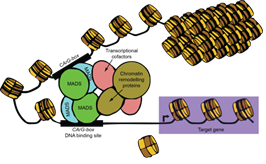Research Theme
Plant developmental genetics and evolution
Flower development is one of the best understood and economically most important developmental processes in plants. It serves as a model system to understand organ specification and cellular differentiation in plants, starting from pools of undifferentiated ‘stem cells’ residing in meristems. Flower development is controlled by the action of key-regulatory transcription factors, which 'read' the genomic information (cis-regulatory code) and coordinate gene expression to generate specific organ morphologies.
The goal of our research is to understand how a small number of key regulatory transcription factors (TFs) coordinates gene expression in order to generate specific floral organ morphologies, and how the functions of these factors diversified to create the great diversity of flower morphologies seen in nature.
Molecular Genetics of Flower Development
- Mechanisms of gene regulation by key regulatory transcription factors
- Transcriptional regulatory networks in flower development
- Chromatin dynamics in development

Molecular Evolution of Flower Development ("Evo-devo")
- Evolution of floral gene regulatory networks
- Evolution of target genes of floral MADS-box transcription factors

Key techniques
We use a variety of molecular biological, biochemical and genetics approaches to address our questions, for example ChIP-seq, SELEX-seq, protein complex isolation, gene expression studies and classical genetics.